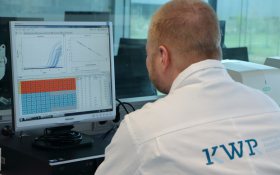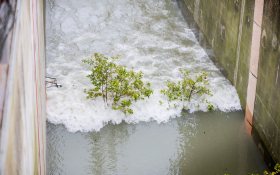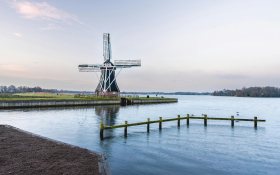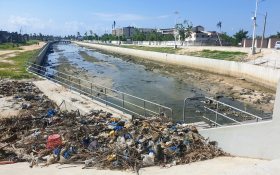COP21: Adaptive planning for river deltas calls for flexible strategies
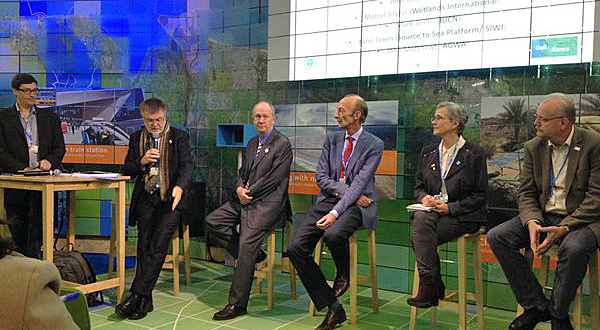
The development of urbanizing river delta areas calls for an adaptive planning, based on flexible strategies that include the use of nature as an infrastructure.
This was a key message at the meeting 'Adaptive planning and development for urbanizing deltas' where international knowledge organisations told about their activities to develop more knowledge on the challenges in these low-lying and often densely populated areas.
The meeting was organized by research institute Deltares, United Nations Environment Programme and knowledge network organisation Delta Alliance, in the Dutch climate pavilion at the COP21 conference in Paris on 3 December.
Emerging knowledge worldwide
At the side event of the climate summit seven organisations presented their current work on the issue of urbanizing deltas. Together they addressed the question how to synthesize the knowledge that is emerging worldwide from a fast growing number of knowledge oriented organisations and network communities.
Two recurring themes in the presentations were the need for flexible strategies and nature-based infrastructure.
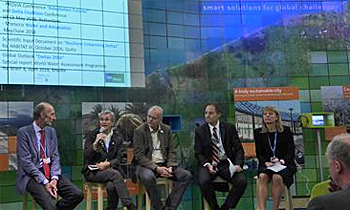 Flexible strategies
Flexible strategies
Agencies managing water systems have to take decisions about infrastructure that will be in place for fifty or a hundred years. However, the unpredictability of climate change makes it difficult to predict the best approach.
"Different climate scenarios often produce a picture that isn’t clear or straightforward", said Manager climate adaptation Cees van de Guchte (top photo third from right) of Deltares on the occasion of the meeting in Paris.
"That makes adaptation even more difficult. What matters is to develop a strategy for the long term that is flexible enough to respond to unexpected developments. That is what we call an adaptive planning approach. That factors in not only different futures but also the different pathways leading to those futures", Van de Gughte added.
Important role for wetlands
Organisations that presented themselves at the side event included the Alliance for Global Water Adaptation, Global Water Partnership, UN Environmental Programme, Ramsar, IUCN nature conservation, Delta Alliance and Wetlands International.
Given their background, the presenters emphasised to share more knowledge and experiences on nature-based infrastructure.
Deputy Secretary General Ania Grobicki (top photo second right) at the Ramsar Convention on Wetlands called river deltas collision hot spots, where environment and development compete for the limited space that is available. "Particularly in deltas, wetlands can play an important role balancing these two interests", Grobicki said.
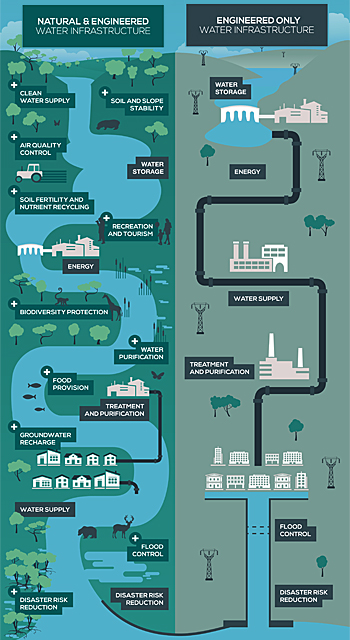 Infographic by IUCN that illustrates the many more services provided by natural and engineered water infrastructure, compared to traditional water infrastructure.
Infographic by IUCN that illustrates the many more services provided by natural and engineered water infrastructure, compared to traditional water infrastructure.
"Wetlands have extremely high biodiversity that we need to preserve what is left of the ecosystems". According to Grobicki the functioning of their ecosystems is important as wetlands provide several social and economic benefits, including fresh water supply and flood control.
"Ramsar wants to reach out and work together with the water community to make the case", she added.
She encouraged the water community to use successful cases of Integrated water resource management (IWRM) that incorporated and valued natural infrastructure. "It may well be that we have already turned the corner", Grobicki said.
Using nature as infrastructure
Director Mark Smith of IUCN's Global water programme agreed that protection of biodiversity and sustainable development can go hand in hand. "Our focus here at the COP21 should focus on nature-based solutions", he said at the side event.
His organization IUCN is involved in many programmes that address the issue of nature-based solutions. "We need to develop green growth strategies that include water security. The critical challenge is to phrase our objectives. What is the best case scenario for river deltas", he asked.
Smith specifically mentioned their IUCN programme 'Wise-up to climate' that links ecosystem services more directly into water infrastructure development in the Tana (Kenya) and Volta (Ghana-Burkina Faso) river basins.
The programme shows that it is possible to use nature to reduce the costs for infrastructure. Nature-based infrastructure, alongside engineered infrastructure combines costs effectiveness with nature conservation.
Water flows to its money
Another issue raised was the financing. John Matthews (top photo left) of Alliance for global water adaptation advocated to involve more intermediates such as financial institutes and insurance companies. "If mangrove forest can include agroforestry systems to produce oil and fish, we should better illustrate these economic benefits", according to Matthews.
He ended the side event quoting the old English saying that water does not flow down the hill, but to its money.
Read also on this website
● Climate change will hit energy-related water use in multiple ways, 8 December 2015
● COP21: Rotterdam wins C40 cities award for its adaptation strategy, 7 December 2015
● COP 21: Netherlands grants 50 million euro to help civil societies in disaster prone areas, 3 December 2015
More information
Deltares
Delft, the Netherlands
+31 88 335 8273
www.deltares.nl/en
Delta Alliance
Wageningen, the Netherlands
+31 317 486 543
www.delta-alliance.org
Delta coalition
www.deltacoalition.net
A 2 min interview with Mark Smith of IUCN. His key message for COP21 is to use water in the way forward for the climate discussions, including nature-based solutions.
